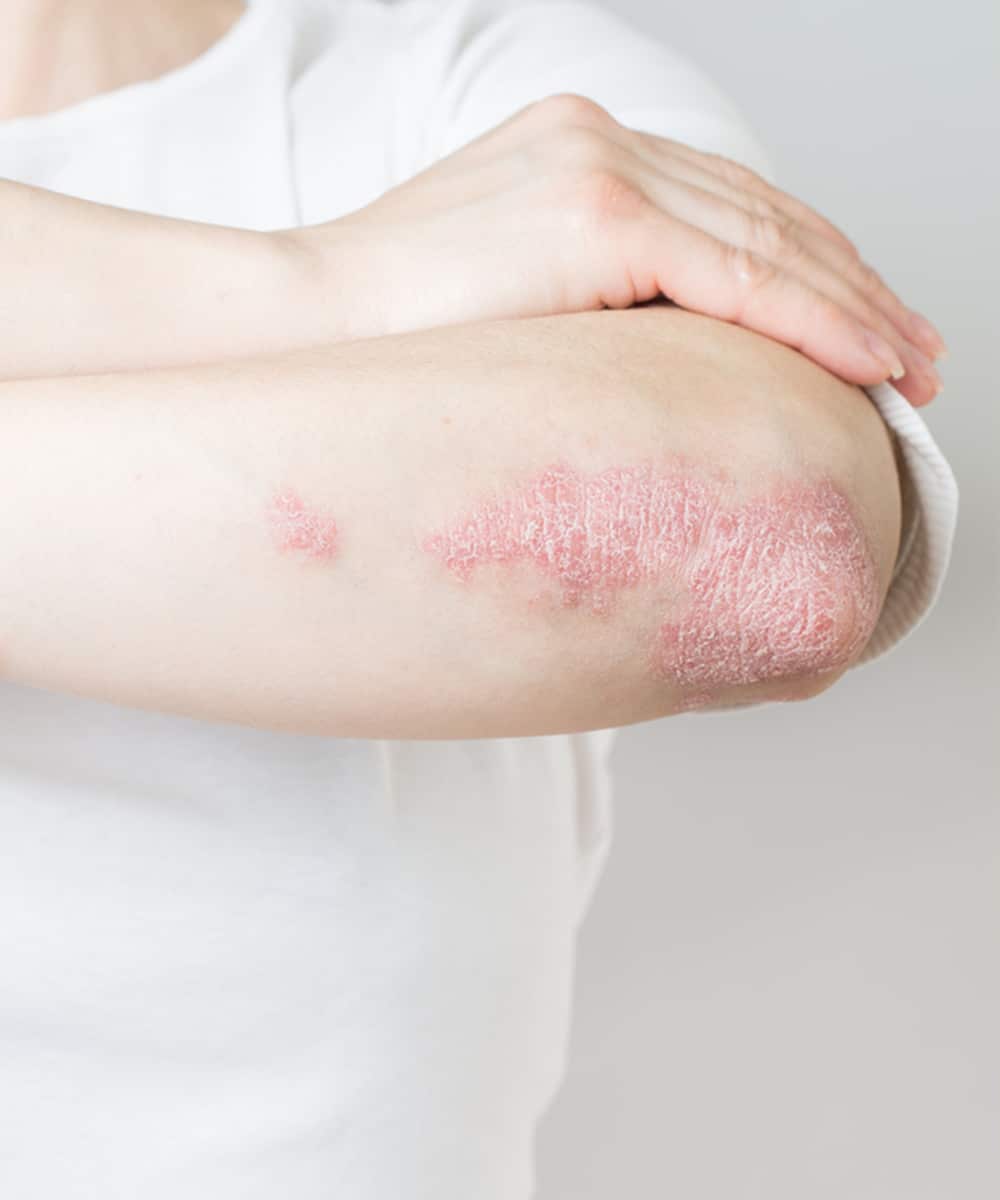Treating Psoriasis Treatment
Psoriasis treatment at Rodgers Dermatology in Frisco, TX.
Understanding Psoriasis and How To Treat It
Psoriasis affects more than 8 million people in the United States. About 70 to 90 percent of people with psoriasis report itching, impacting their overall quality of life. In addition to skin symptoms, many individuals with psoriasis also experience joint pain, which can significantly impact their quality of life. No one knows exactly what causes psoriasis. However, a person’s immune system and genetics can play major roles in its development. Additionally, there are usually some factors that trigger psoriasis to flare.
What do you need to know about your psoriasis? How can we treat it? What are some strategies for managing symptoms? We answer all of these questions and more.

What is plaque psoriasis?
Plaque psoriasis is a skin condition that causes red patches of skin with white, flaky scales. It most commonly occurs on the elbows, knees, and trunk but can appear anywhere on the body. Itching is one of the most common symptoms associated with the condition. Some people describe it as a burning sensation, while others compare it to being bitten by fire ants.
Psoriasis occurs when the immune system misfires, causing a rapid growth of skin cells that build up on the skin’s surface.
At Rodgers Dermatology, we help our psoriasis patients manage their symptoms and return to normal life as quickly and effectively as possible.
How do we treat psoriasis?
What does management and treatment of the condition typically look like?
Treating psoriasis itch is one of our main goals since it can drastically affect the quality of daily life. Reducing the itching sensation can significantly improve the condition and the ability to cope with it. Additionally, effectively treating psoriasis can reduce psoriasis lesions, irritation, and pain. Over-the-counter treatments can often be effective for mild psoriasis, while severe psoriasis may require more complex treatment strategies. There are a variety of ways that we can help you manage your symptoms, including itching.
Topical treatments are often the first line of defense and can effectively reduce symptoms. Light therapy, including UV light therapy, is another option that can be part of a personalized treatment plan. Systemic treatments, which work throughout the body, are also available and can be very effective for more severe cases.
It’s essential to consult a medical dermatologist specializing in psoriasis to ensure you receive the most effective treatment. They can provide a comprehensive treatment plan tailored to your specific needs.
Phototherapy treatment, prescribed by a dermatologist, can significantly improve symptoms. This method uses specific wavelengths of light to target psoriasis lesions and reduce inflammation.
Psoriasis treatments have advanced significantly, including topical, systemic, and phototherapy options. These advancements have made it possible to manage the condition more effectively and improve the quality of life for those affected.
Individuals with psoriasis also risk developing psoriatic arthritis, a painful joint disease that requires comprehensive care. Collaborative care between dermatologists and rheumatologists is essential to manage both conditions effectively.
FAQs:
Psoriasis, specifically plaque psoriasis, is a chronic skin condition characterized by red patches covered with white, flaky scales. It can occur anywhere on the body but is most commonly found on the elbows, knees, and trunk. One of the most prevalent symptoms is itching, ranging from mild irritation to a severe burning sensation. Some patients compare the feeling to being bitten by fire ants.
The condition occurs when the immune system misfires, causing a rapid growth of skin cells that build up on the skin’s surface.
While the exact cause of psoriasis is unknown, it is believed to be linked to an overactive immune system and genetic predisposition. Various factors can trigger flare-ups, including stress, skin injuries, certain medications, and environmental factors. Identifying and managing these triggers can help reduce the frequency and severity of flare-ups.
Additionally, individuals with psoriasis are at risk of developing psoriatic arthritis, a painful joint disease that requires comprehensive care.
At Rodgers Dermatology, we focus on reducing symptoms like itching and irritation to improve patients’ quality of life. Over-the-counter treatments can often be effective for mild psoriasis, while severe psoriasis may require more complex treatment strategies. Treatment options include moisturizing the skin, using scale-softening products, stress management techniques, and cold showers to alleviate discomfort. Light therapy, including UV light therapy, is another option that can be part of a personalized treatment plan. If necessary, prescription treatments such as antihistamines, phototherapy, steroids, biologics, or excimer laser therapy may be recommended. It’s essential to consult a medical dermatologist specializing in psoriasis to ensure you receive the most effective treatment. A combination of at-home care and medical treatment often yields the best results. Phototherapy treatment, prescribed by a dermatologist, can significantly improve symptoms. Psoriasis treatments have advanced considerably, including topical, systemic, and phototherapy options.
At-home remedies include regularly moisturizing the skin to reduce redness and irritation, using over-the-counter lotions with salicylic acid or urea to remove scales, and practicing stress-relief techniques like meditation or exercise. For mild psoriasis, over-the-counter treatments can often be effective in managing symptoms. Cold showers and refrigerated lotions can provide additional relief from itching. These strategies, combined with medical advice, can significantly improve symptom management.
Schedule an Appointment with Dr. Rodgers for Psoriasis Treatment in Frisco, TX
If you are ready to learn more about the dermatology options that may be right for you to treat your psoriasis, schedule a consultation with us here at Rogers Dermatology. Call 972-704-2400 or book your appointment online. In doing so, you’re taking the first step on your journey to beautiful, healthy skin.
